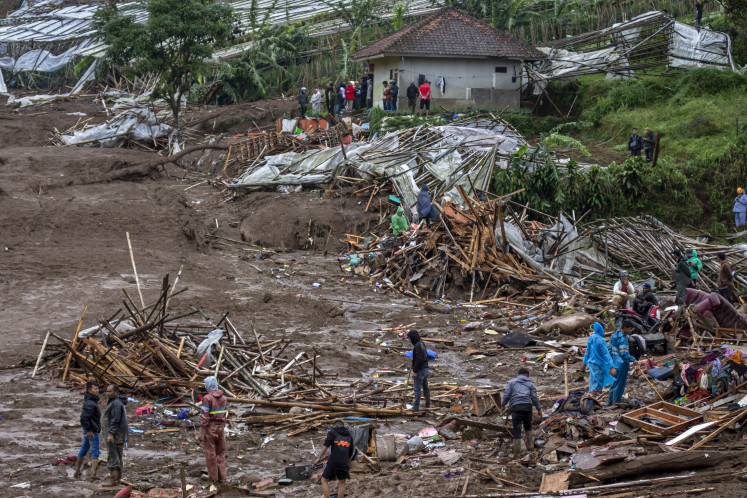Popular Reads
Top Results
Can't find what you're looking for?
View all search resultsPopular Reads
Top Results
Can't find what you're looking for?
View all search resultsCore of Costa Rica’s foreign policy
Most Indonesians I have met are knowledgeable about Costa Rica
Change text size
Gift Premium Articles
to Anyone
M
ost Indonesians I have met are knowledgeable about Costa Rica. Although Costa Rica is a small country in Central America with a little over 5 million people — less than half of Jakarta’s population — it has a long history.
This year we celebrated the 198th anniversary of our independence. In 1869, free and obligatory primary education was established and in 1882 Costa Rica abolished capital punishment. This principle is protected in the Constitution of the Republic of Costa Rica, which provides that “human life is inviolable”.
These two events laid the foundation of our commitment to strong rule of law under civilian power, egalitarian social culture and the axis of the country´s future foreign policy.
On Dec. 1, 1948, after a short civil war in which 2,000 people were killed, then-president José Figueres Ferrer abolished the military and transformed the most important military base in the country into a national museum. From that moment on, the national resources allocated for military expenses have been directed toward social investment in free education, healthcare services and environmental protection.
The public policy and political culture of Costa Rica have created a long-standing democracy and a stable republic in Central America. Costa Rica remains one of the few countries without a standing army of any kind and only maintains national police forces. As we do not have military troops to defend our country, our troops are our teachers and diplomats, who educate our children and defend us in international forums.
These experiences pave the way to our foreign policy. Costa Rica is a country that has made the universal values of human rights, sustainable development, democracy, the rule of international law and norms and environmental protection the fundamental pillars of our foreign policy. We are truly committed to promoting them. Those values have been part of our identity and have been internalized, not only by Costa Rican diplomats, but also our people.
Costa Rica played an important role in establishing the United Nations Human Rights Commission and later successfully endorsed the establishment of the UN High Commissioner for Human Rights. Since 1947, Costa Rica has held a seat in the Human Rights Council over six times. As a proof of our commitment to human rights, San José, the capital of Costa Rica, is the host of the Inter-American Court of Human Rights of the Organization of American States.
We can invest 8 percent of our gross domestic production in education as we don’t have military spending.
The abolishment of the military has benefited our country in many ways. We can invest 8 percent of our gross domestic production in education as we don’t have military spending. As President Carlos Alvarado Quesada said, “our strength is human talent, human wellbeing.”
Protecting nature and the environment is our priority. The land area of Costa Rica covers only 0.03 percent of world’s land mass, yet in such a small spot, it has 6 percent of the world’s biodiversity.
Forests are crucial to the country’s biodiversity. In the 1980s, forest coverage was reduced to almost 20 percent because of animal farming and logging. Today, we have managed to reforest 51 percent — more than half — of Costa Rica, 25 percent of which is classified as a protected area or national park. Environmental protection efforts boost Costa Rica’s economy. Our tourism sector has grown significantly because of our natural environment.
In 2018, 99 percent of Costa Rica’s national electricity supply was generated from renewable sources, especially solar, wind, hydroelectric and geothermal sources. In February 2019, President Alvarado announced plans to reach the goal of Net Carbon Zero by 2050. Costa Rica wants all of its electricity to be generated by renewable sources by 2030.
The Decarbonization Plan is in line with the objectives of the 2030 Sustainable Development Agenda and the Paris Agreement. To realize the plan, Costa Rica will make significant transformations to transport and mobility, energy management, waste management and the sustainable use of land. According to the Planning Ministry, Costa Rica aims to be a modern, green, emission-free, resilient and inclusive economy that responds to changes of global context and promotes the sustainable use of natural resources.
Last September, the UN presented the 2019 Champions of the Earth award for policy leadership, its highest environmental honor, to Costa Rica in recognition of its decades-long commitment to policies to tackle climate change and to protect nature, which involved the state, citizens, scientists and the private sector.
One of Costa Rica’s main goals is to fight climate change and its consequences. Although those changes will affect all countries of the world without discrimination, their effects will be greater in archipelagic countries and those with fewer resources to face changes.
As this year marks the 34th anniversary of diplomatic relations between Costa Rica and Indonesia, the two countries will be able to collaborate internationally for global peace and security, exchanging experience with women’s empowerment, environmental protection and renewable energy. When we decided to open the Embassy in Jakarta in 2017, we did it with the firm desire to strengthen relations in many fields, and we are working to achieve that goal.
We are more than ready to share our experiences. Costa Rica — Pura vida!










